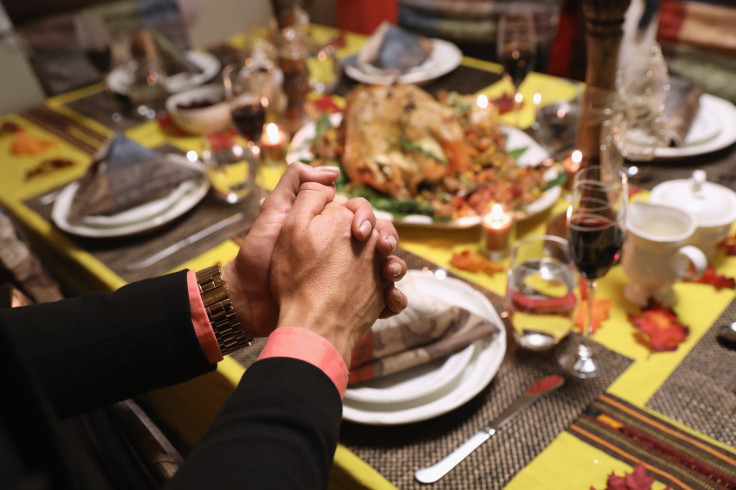New to The Thanksgiving Menu: Cutting Yourself Slack

Although Thanksgiving, and the holidays that follow, might be billed as a time of indulgence -- with creamy pumpkin pie, buttery rolls and plenty of egg nog -- a little indulgence might not be a bad idea. Instead of trying to lose weight or being "good” this year, experts suggest taking care of yourself, even if it means having a second dessert.
Alison Pelz is a psychotherapist and registered dietitian living in Austin, Texas. She said that, as lovely as the holidays are, we should acknowledge that they can also be very stressful. “There's so many other things that people are managing right now,” said Ms. Pelz, who specializes in eating disorders, “it's okay, sometimes, if you use food to regulate emotions, particularly in periods of stress.”
Turkey with a side of stress
And this holiday season could indeed be defined as a period of stress. In 2016, researchers found that the day after Christmas heart failure cases spiked. They mentioned holiday stress as a possible contributing factor.
Now, nearly a year into a global pandemic, the pressure is piling on. The CDC is encouraging people to stay home, likely defining a holiday that might be lonely, scary and undoubtedly stressful, regardless of what families decide to do.
But where does food fit into that?
Eating to feel better
Eating can be a coping mechanism to deal with stress, and holidays may play into more significant patterns around disordered eating. This is all before adding the preconceived idea that people will eat “badly” over the holidays and struggle to lose weight in the new year.
Ms. Pelz encourages people to break that cycle and to take the pressure off themselves. “There's lots of articles about how to not gain weight during the holidays. There's lots of articles about how to make lower-calorie foods,” she said. “… I think the reason why I'm encouraging people to kind of give themselves a pass over the holidays is because diet culture comes in and is pushing people to ‘be good’ during the holidays.”
She isn’t alone. Marisa Moore, a registered dietitian in Atlanta, Ga., has a similar message. “I'm not the type of dietitian who has ever said, ‘Oh, swap this or that for your favorite pie.’ If you like pie, then enjoy your pie,” said Ms. Moore. “I don't think you have to give up your favorites.”
What matters, said Ms. Moore, is not whether you use reduced-fat whipped topping or skim milk, but being in touch with how you feel and reaching out for help when you need it -- be it about food or anything else.
Spicing it up
For some, the issue might not be stress eating; it might be cooking stress. After months of being at home, one more sink of dishes or one more pile of vegetables to cut might seem daunting.
“You have permission to buy the pre-cut butternut squash. You have permission to buy the pre-cut broccoli or whatever is going to make your life a little bit easier,” said Ms. Moore. Cutting yourself some slack can start in the kitchen and continue into the dining room.
For people who feel safe doing it, she suggested meal swaps with friends or neighbors. Cooking for a crowd or trying someone else’s favorite meal might help people get out of their cooking ruts.
Lonely snacking
But groups aren’t always an option. In fact, this year, people may be looking at a lonely holiday. And that can be tough.
“You know, some people use food to regulate emotion, and loneliness would be one,” said Ms. Pelz.
Ms. Moore suggested reaching out to have virtual get-togethers, making favorite Thanksgiving foods for one, or creating new memories. “It's not the same as being there and being able to give people hugs, but this will be a year that we'll probably all remember that one time your favorite aunt told you how to make a pound cake via FaceTime.”
Going home for the holidays also might be stressful, either in the form of Covid-19 worries or regular old family tension. For that, Ms. Pelz prescribed a good set of boundaries.
“So, boundaries can be verbal things like, ‘No, thank you,’ or ‘This is what I need,’” she said. “It also can mean taking breaks, taking time for yourself, removing yourself from the situation, [or] it can also mean changing the conversation topic.”
Making a change
With more time inside and less to do during the winter holidays, some people might feel sluggish, or find that those Christmas pajamas from last year are a bit snug. Neither dietitian is an advocate of dieting.
Ms. Pelz likes intuitive eating. For an example, look no further than children. “Kids are perfect intuitive eaters,” she said. “Infants cry when they want to be fed, [and] they turn their head when they don't want to be fed any more.”
That, in a nutshell, is intuitive eating. “Intuitive eating is the opposite of dieting,” Ms. Pelz said. Dieters adhere to rigid external rules. With intuitive eating, “you listen to internal cues about how foods make you feel, what you want to eat, and how much of it,” she said. Intuitive eating might mean gingerbread cookies, it could mean a winter veggie salad with kale and almonds, or it could mean both.
Ms. Moore suggested getting enough exercise and sleep over the holidays, and knowing that it is okay to reach out for professional health.
So, whether alone or in a big group, don’t let the fear of eating “badly” ruin this Thanksgiving. Instead, check in with yourself and listen to what you need.



























